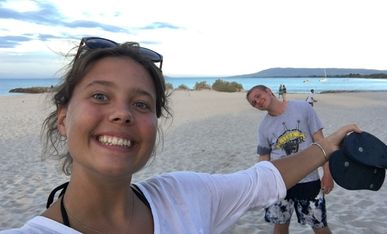Frequently asked questions
High School Exchange Programs – questions and answers
We’ve gathered the most frequently asked questions that we receive from parents and students. The best way to find out more is to join one of our Information Session Webinars or contact us on scceaust@scce.com.au or phone (03) 9775 4711.
When you go on a high school exchange, you take a break from high school at home so you can attend a high school abroad, immersing yourself in the local life, culture, language and education system. When your exchange is finished, you go back and resume school in your home country.
As an exchange student, you live and become part of a new host family. You attend the local high school and participate in lessons just like any other student. Programs are available for an Academic Year or Semester, however we also have Short Programs ranging from 6 weeks – 3 Months.
Read more here!
Knowledge of the host country language is preferable, but not essential for most destinations except for Japan, where 2 years’ study is required. However, we do encourage students to work on their language skills prior to departure as this will help them to settle in more easily.
An exchange student learns best by becoming completely immersed in the host culture and daily host-family life, and through temporarily halting the Australian way of life. This is why we discourage friends going together. You can definitely encourage your friend to apply as well, but do not expect to be placed near each other as your placement will be determined by the best host family match – not geographically. It is a system that works very well to ensure you have the best chance at an amazing student exchange experience!
SCCE is a not-for-profit organisation, therefore our fees reflect the actual costs of the program. All key program components are covered including:
– Return economy airfares from your nearest capital city with a reputable carrier. Please note that a flight surcharge may be applied to all applications. We reserve the right to increase the flight surcharge if, at the time of making flight bookings, airlines are charging a higher amount for flight prices. If there is no increase made to flight prices, then we will not charge a flight surcharge.
– Travel to and from your host community at the beginning and the end of the program – this may be a domestic flight, bus or rail transfer.
– Full comprehensive medical, hospital, health, accident, baggage, cancellation, personal liability & travel insurance. Please be aware that full medical insurance is provided for all COVID pandemic related medical costs whilst on program but any other COVID specific related expenses including but not limited to early return or quarantine fees are not covered by this insurance policy. -The policy can be viewed in full on the insurance page on our website.
– Personal support before and during your exchange.
– Application Support.
– Pre-Departure Orientation Meeting online.
– Arrival Orientation meeting in your host country (may be in your host community). Overnight Soft Landing Camps may be available at an additional cost (subject to your program length).
– Full board in a carefully selected host family.
– Enrolment at your host school. In most destinations, students are not required to wear a school uniform. If your program is in one of the few destinations that requires that you purchase/rent a uniform, then this would be payable upon commencement of your program (direct to the school/uniform shop).
– Southern Cross Cultural Exchange admin costs.
– Safety & Emergency Information.
– Your own Southern Cross Cultural Exchange Program Coordinator to support you throughout your time away as necessary and required.
– 24/7 emergency phone.
– Organisation & Local Coordinator in your host country.
– Progress reports to parents during the program.
– Certificate of completion.
As a general rule the program fees are roughly split as follows depending on the destination, program and departure date:
24% Program fees
28% Flight and travel costs
48% Care and support
A flight surcharge may be applied to all applications. We reserve the right to increase the flight surcharge if, at the time of making flight bookings, airlines are charging a higher amount for flight prices. If there is no increase made to flight prices, then we will not charge a flight surcharge.
– Personal spending money
– Passport & Visa costs
– Vaccinations
– Optional Soft Landing Camps, language courses, optional excursions and tours
– Flight Surcharge
– Additional luggage fees
Regardless of the length of the student exchange program you choose, Australian, New Zealand and overseas staff have the same responsibilities for selection, host family placement, bookings, staffing, support and accessibility.
Students holding an Australian passport, going on program for 90 days or less generally do not need a visa. Most long term programs will require a visa. All visa administration costs and consulate fees are not included in the program fee.
As there is little continuity of educational systems throughout the world, Australian schooling may be interrupted, so it is crucial to discuss your plans for exchange with your school before and after your program – and keep in mind many students change their goals upon return.
SCCE and our partners have specific dates for the arrival of students on Classic programs. This is dependent upon school start dates, arrival orientations and visa requirements. In some instances, students may be permitted to arrive or depart on an alternative date. Select Programs to Canada and the USA have a bit more flexibility as the dates will depend on the school district you ultimately choose.
Parents, family members and friends are not allowed to visit you whilst on exchange. This contact distracts students from fully immersing themselves in the exchange experience. Arrangements can be made for your parents to sign you off program at the end of your exchange if they want to meet you and travel with you.
There may be school excursions, tours offered by the overseas affiliate, or a family trip to look forward to but any independent travel, however, is strictly prohibited.
The first few weeks with your new host family can be challenging as students miss home and can experience culture shock and miscommunication. Each student is assigned a Local Coordinator who is there to assist and support both the student and the host family, and to help with discussions and negotiations.
Your safety and security is our number one priority. Along with our overseas partners, we are constantly monitoring the security situation around the world. Advice is taken from the relevant authorities and DFAT and in the event of any pandemic, security or terrorist related incident, we are in contact with parents to reassure them that all the necessary precautions are in place to minimise the risk to their child. We also ensure that each child has the necessary emotional support provided to them by their host family, Local Coordinator and our partner in that country.


